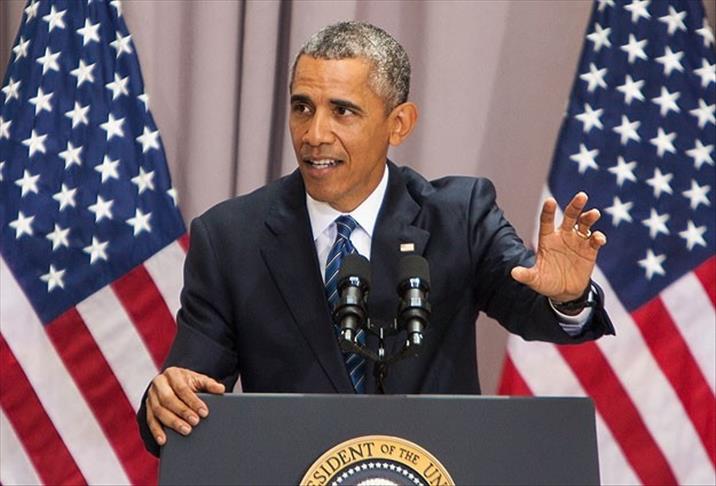
WASHINGTON
The choice by lawmakers whether to confirm or reject a recently brokered Iran nuclear deal is “the most consequential foreign-policy debate” since Washington decided to invade Iraq in 2002, President Barack Obama said Wednesday.
His comments came during a speech at American University - where 50 years ago former President John Kennedy famously spoke about the dangers of nuclear proliferation and the importance of diplomacy.
Obama said that the deal builds upon the “tradition of strong, principled policy diplomacy” that prevented heightened tensions with Cuba from escalating into nuclear war, and ensured that Washington and Moscow agreed to curbs on their armaments during the Cold War.
“If Congress kills this deal, we will lose more than just constraints on Iran's nuclear deal or the sanctions we have painstakingly built. We will have lost something more precious: America's credibility as a leader of diplomacy,” the American president said. “America's credibility is the anchor of the international system.”
The Obama administration has been locked in a fierce public battle with Congress about the agreement, with lawmakers often lodging vitriol at officials during public testimony, and officials at times becoming visibly enraged at the comments.
Israeli Prime Minister Benjamin Netanyahu, a highly critical voice on the agreement, has consistently urged lawmakers to vote against the deal, arguing that it is historically bad.
Obama said that in arguing against the accord, he believes Netanyahu “is wrong,” adding that "every nation in the world that has commented publicly, with the exception of the Israeli government, has expressed support" of the deal.
“I believe the facts support this deal,” he said. “I believe they are in America's interests and Israel's interests, and as president of the United States it would be an abrogation of my constitutional duty to act against my best judgment simply because it causes temporary friction with a dear friend and ally.”
Leading Republican presidential candidates have sharply denounced the deal in the race for their party’s nomination, with some saying that they would tear it up and re-impose sanctions on Iran if elected to office in 2016.
In a potentially ominous sign, three House Democrats – Steve Israel, Nita Lowey, and Ted Deutch – announced Tuesday that they would not support the deal, raising the stakes for the administration as it makes the case for the deal before an expected vote in September.
Obama chided critical lobbyists and pundits who he said have become “armchair nuclear scientists” overnight, arguing that if lawmakers discard the deal in preference for a better one, Tehran will be the main beneficiary.
“What's more likely to happen should Congress reject this deal is that Iran would end up with some form of sanctions relief without having to accept any of the constraints or inspections required by this deal,” he said. “In that sense, the critics are right. Walk away from this agreement, and you will get a better deal -- for Iran,” he said.
Anadolu Agency website contains only a portion of the news stories offered to subscribers in the AA News Broadcasting System (HAS), and in summarized form. Please contact us for subscription options.







